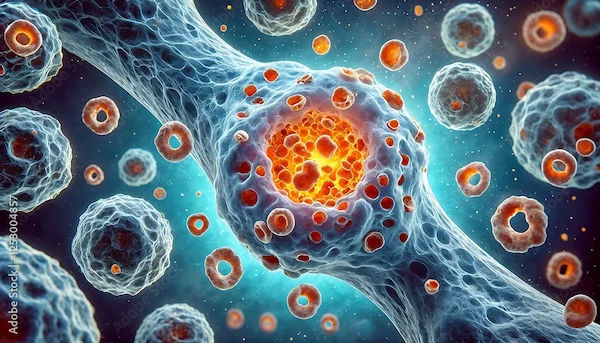Immunotherapy For Cancer
Explore how cancer immunotherapy uses the body’s immune system to target and treat cancer. Learn about its types, benefits, side effects, eligibility, and advances in aiding cancer treatment.

Written by Dr Sonia Bhatt
Last updated on 3rd Jul, 2025
Immunotherapy For Cancer: What It Is And How It Works?
Cancer is a disease of uncontrolled cell growth that can spread to other tissues. In the human body, cells divide in an orderly manner, but disruptions can cause abnormal growth of malignant or benign cells.
Cancer immunotherapy uses the body’s immune system to fight cancer. When immunotherapy antibodies are modified, they bind to tumour antigens on the surface of cancer cells and can trigger an immune response. These antibodies recognise and mark those cells so that the immune system can destroy or stop them.
Here’s a detailed read-through of immunotherapy when it comes to treating cancer patients.
Types of Cancer Immunotherapy
There are four main groups of immunotherapy that prompt the immune system to attack the tumour cells by using cancer antigens as targets.
1. Monoclonal Antibodies
The most successful form of immunotherapy today is monoclonal antibody (mAb) therapy. This is a lab-designed protein that binds to cancer cells. Various cancers are treated with approved mAbs, including:
Rituximab: Chronic Lymphocytic Leukemia
Ipilimumab: Metastatic Melanoma
Trastuzumab: Breast Cancer
2. Cancer Vaccines
They are used in the treatment of an existing cancer or in preventing a new cancer from developing.
Preventive cancer vaccines such as HPV and Hepatitis B vaccines prevent cervical and liver cancer, respectively.
Therapeutic cancer vaccines (Provenge and T-VEC) are used to treat existing cancers. Some cancer viruses have proven extremely effective for vaccines.
3. Cytokines
These can be administrated to regulate and coordinate the immune system's behaviour. Examples include:
Interferon ∝: This is used in the treatment of hairy cell leukaemia, AIDS-related Kaposi’s sarcoma, follicular lymphoma, chronic myeloid leukaemia, and malignant melanoma.
Interleukin-2: It is used for the treatment of malignant melanoma and renal cell carcinoma.
4. Adoptive Cell Transfer
This method involves extracting immune cells from cancer patients, either from the blood or directly from the tumour. The immune cells specific to the tumour are then identified, expanded in the laboratory, and reintroduced into the patient. Once reintroduced, these cells, such as NK cells, T cells, or dendritic cells, trigger an immune response against the cancer.
How Immunotherapy Works in Treating Cancer?
Immunotherapy uses parts of the immune system to fight diseases such as cancer. It can either enhance the immune system's natural ability to fight cancer cells or create lab-made substances that help the immune system attack cancer cells.
Benefits of Cancer Immunotherapy
Unlike traditional cancer treatments, immunotherapy has unique advantages. These are:
It targets cancer cells specifically, sparing healthy tissues and increasing treatment efficacy.
Immunotherapy of cancer research has emerged as a key treatment option for improving overall and progression-free survival, especially for recurrent or metastatic cancers.Its potential for achieving long-term remission and improved survival rates was evaluated in a review of 34 relevant studies.
Immunotherapy has a better quality of life for patients than chemotherapy or radiation, as it reduces side effects.
With targeted therapy, patients can continue with daily life activities more comfortably and remain physically and emotionally stable during treatment.
Side Effects of Immunotherapy
Immunotherapy has benefits, but not without potential side effects. Understanding and managing these side effects is important to maximise patient outcomes and efficacy.
Side effects of immunotherapy include:
Fatigue
Fever
Rashes
Nausea
Adverse effects may include immunity-related conditions, which involve inflammation of healthy tissues in the lungs, liver, and endocrine system. The reactions are due to the immune system's stimulated activity, which can attack normal cells.
Immunotherapy-Related Side Effects and Symptoms
| Side Effect | Signs and Symptoms |
| Pneumonitis(Inflammation of the lungs) | Shortness of breath(with activity or at rest) Chest pain Swelling in hands or feet New or worsening cough(dry or with phlegm) |
| Arthralgia & Myalgia(Joint and muscle pain) | Stiffness(difficulties in movement) Joint or muscle pain Swelling at joints or limbs |
| Hepatitis(Inflammation of liver) | Severe nausea or vomiting Jaundice Pain in the right stomach area Tea-coloured urine Bleeding/bruising anywhere Appetite loss |
| Colitis(Inflammation of the colon) | Diarrhoea or increased bowel movements Blood in stool Severe abdominal pain or cramping |
| Hormone/Gland Problems | Extreme fatigue Persistent headaches Weight changes Mood changes(irritability or forgetfulness) Hair loss Constipation Increased thirst or urination |
| Uveitis(Eye and vision problems) | Eye pain or redness Floaters in vision Sensitivity to light Headaches Blurry or double vision |
| Meningitis/Encephalitis(Brain inflammation) | Headaches Fever Confusion or memory problems Hallucinations Severe muscle weakness Neck stiffness |
The best form of immunotherapy requires proper management of side effects. Adverse effects can be mitigated by close monitoring, early intervention, and supportive care. Immunosuppressive drugs, such as corticosteroids, are used to control inflammation and functioning.
Eligibility for Cancer Immunotherapy
Immunotherapy is only available to patients depending on several factors, including cancer type, stage, and overall health.
For melanoma, non-small cell lung cancer, bladder cancer, and some subtypes of lymphoma, immunotherapy has worked well.
The potential of immunotherapy is expanding to breast, colorectal, and prostate cancers, where it is being used today.
Factors such as biomarker presence, e.g. PD-L1 expression or MSI-H status, determine patient suitability for this treatment. Those with a strong immune system but few comorbidities are usually the better candidates. Oncologists perform comprehensive evaluations before choosing immunotherapy as an appropriate and effective treatment option.
Consult Top Oncologists For Immunotherapy Eligibility
Immunotherapy Treatment Process
The patient's medical history, cancer type, and previous treatments are carefully evaluated during the initial consultation. To be eligible, diagnostic tests, such as imaging and biomarker assessment, are performed. Oncologists explain the outcomes and side effects to help with informed decisions.
Immunotherapy can come as intravenous infusion, oral medication, or local injection. The duration of the treatment is based on the type and stage of the cancer, the particular immunotherapy drug, and the response to the immunotherapy in the individual.
Advances in Cancer Immunotherapy
Recent advances in immunotherapy include a combination of a STING (Stimulator of Interferon Genes) agonist and an autophagy-targeting compound that shrinks tumours and increases survival.
Gliomas are highly aggressive brain cancers for which CAR (Chimeric Antigen Receptor) T-cell therapy has been successful. Other research is focused on understanding how particular gut bacteria, including the TANB (Clade of Gut Bacteria) 77 clade, boost responses to cancer immunotherapy.
Advancements are in overcoming resistance, increasing efficacy against solid tumours, and using gene editing and nanotechnology to improve drug delivery. Moreover, artificial intelligence customises treatment approaches by analysing patients’ data.
Immunotherapy vs. Traditional Cancer Treatments
Chemotherapy and radiation are traditional treatments that specifically target cancer cells, but they also injure healthy tissue, while immunotherapy is based on the body’s natural immune abilities.
In some cases, both approaches can be combined for synergistic effects. In comparison to traditional treatments, immunotherapy favours outcomes with long-lasting remission and long-term effects.
When to Choose Immunotherapy?
If immunogenic tumours or tumours that have not responded to conventional therapies are noticed, immunotherapy is indicated. The approach benefits late-stage cancers and those with an unfavourable response to traditional therapy and can strengthen the impact of combined treatment approaches.
Conclusion
Immunotherapy is a groundbreaking cancer treatment that harnesses the immune system to target and destroy cancer cells. It offers hope for long-term remission and improved survival, especially for patients resistant to conventional therapies.
Despite challenges, ongoing research enhances its effectiveness and integration with traditional treatments, paving the way for more personalised and promising cancer care.
Consult Top Oncologists For Immunotherapy Eligibility

Dr. Harsh J Shah
Surgical Oncologist
15 Years • MS, MCh (GI), DrNB (GI)
Ahmedabad
Apollo Hospitals Gandhinagar, Ahmedabad

Dr. Vishal Choksi
Head and Neck Surgical Oncologist
20 Years • American Head & Neck Society (AHNS) certified from Memorial Sloan-Kettering Cancer Centre, American Board of Surgery (ABS) certified general surgeon, MBBS (India)
Ahmedabad
Apollo Hospitals Gandhinagar, Ahmedabad

Dr. Mano Bhadauria
Radiation Specialist Oncologist
25 Years • MBBS, MD
Delhi
Apollo Hospitals Indraprastha, Delhi

Dr. V R N Vijay Kumar
Surgical Oncologist
9 Years • MBBS, MS (Gen. Surg.), DNB (Surg. Onco.)
Ahmedabad
Apollo Hospitals Gandhinagar, Ahmedabad

Dr. Ruquaya Ahmad Mir
Surgical Oncologist
20 Years • MBBS, DNB
Delhi
Apollo Hospitals Indraprastha, Delhi
(25+ Patients)


